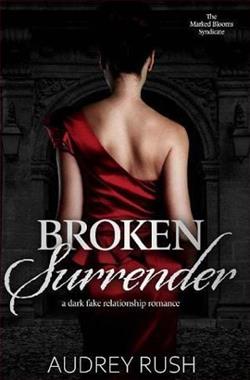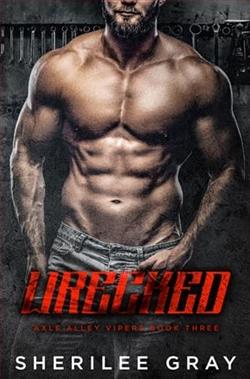Page 114 of The Staircase in the Woods
If you let me all the way in, then I’ll let you out.
In for out.
It’s a bargain! What a steal!
He clenched his teeth, squeezed his eyes, and hurried away from the mirror.
The house doesn’t hate me,he realized. He’d been wrong. They’d allbeen wrong. Whoever carved the message in the very first room they found had been wrong, wrong, wrong. The house did not hate them. Not at all.
No, the houselovedthem.
—
Then, one more door, one more room. Even as he reached for it, he thought,I know what this is going to be. A little bit of prophecy foretold.
The room he’d been avoiding—
The room he’d been so afraid to find—
It found him.
65
Peeling Wallpaper
His father’s skin was the color of the pages of a paperback book soaked in piss—a gray-yellow jaundice. That, the work of the cancer, a cancer that had crawled its way through all parts of him, and was now perhaps the only thing holding him together.
Owen knelt by the bed even as Owen stepped into the room.
Two Owens—both, he supposed, belonging to the house.
The first by the bed, just the memory of Owen. Younger by ten years, that Owen. An Owen that was a little bit healthier, a little bit happier—he had a stable job at a library, he smiled once in a while, he wasjuststarting to do a little writing on the side, just short stories and stuff posted online, but it felt like the seed of something. Like a little spark of promise that might, in the right wind, catch fire.
And then, through the hospice nurse, his father summoned him.
He was dying. Metastatic cancer. Owen didn’t even know where it started but it didn’t matter now. His father was in palliative care for the end of his life.
And here, Owen thought, this is it. The last chance to make it all right. There would be no fixing what had been broken so early on in their relationship—you couldn’t mend a bridge that had never been built. But there might be some hope of understanding each other. His father, who hadn’t wanted him to be born at all, hadn’t seen him since Owen went away to college—and now had called upon his son one last time. Owen wanted to believe it wasn’t too little too late, that this was something they both needed. They would find each other atthe end, before it was too late, and maybe, just maybe, his father would give him—what? If not love, then a little acknowledgment. If not acknowledgment, then just a moment of conversation, however deep or small or shallow it needed to be.
But that wasn’t what his father wanted.
His father wanted one last thing—a final opportunity to stick in the knife. Because when Owen showed up, his father summoned his strength enough to sit up, focus his gaze upon his son, and destroy him one last time.
The words weren’t new. They weren’t even particularly cutting. It was the same-old, same-old. He babbled about how Owen was weak. Worthless. Made his mother weak. Spent too much of their money. Ruined his father’s life just by being born. Check the box marked “all of the above” for: stupid, lazy, a retard, a faggot, ungrateful, an embarrassment, a disappointment, a turd that wouldn’t flush, and all of it kind of justwashedover Owen, and it didn’t take anything from him, the way a wave would take sand from a beach. No, he was stone against this current—it splashed against him, cold, and he let it come and let it go. And that felt good, too, in its own horrible way. And as his father purged his poison, his cheeks grew redder and redder, his lips more spit-flecked, his eyes bulgier like fruits about to burst—
But then he found the breach in Owen’s armor.
A place to really get the knife in and twist.
“I know you wanted to kill yourself,” his father said, slow, sluggish, wormy. “You should’ve, but you didn’t even have the courage to get that right. Still got a chance, though. Still got a chance.” That last bit, said all mushy.Shtill godda shansh. And that was when Owen—that Owen, the Owen from ten years ago, an Owen on the Verge of Feeling Good, instead went the other way. He stood up. He found the little suede bag by the nightstand, the one the hospice nurse said contained the essential hospice drugs—the Haldol, the atropine, the morphine, the lorazepam, the Dulcolax, the fentanyl patches. Owen took them all out, and one by one he emptied them into his father’s mouth. The old man couldn’t fight it—all his energy had beensummoned to hate his son. He couldn’t even cry out. One by one, the meds went in. Owen clamped the mouth shut to make the old man swallow. And then, when the cocktail was applied, Owen watched his father die. As his dad slid from the mortal coil like a coat poorly hung on its hook, he said the words he’d wanted to say his whole life, but never did:
“I hate you, too.”
And then that Owen left, and as he did, he looked up atthisOwen, and he said, “He’s all yours.”
Now, this Owen was all alone. After having watched himself murder his father.It was mercy,he told himself.It was mercy. Mercy. Mercy. Neverborn. Nailbiter. Parasite. Mercy. Mercy. Mercy.And as his mind repeated these phrases, as his father mumbled and echoed some of those same words—even beyond death—“Mercy, mercy, never born, parasite”—he slid his hands along the lengths of his forearms, feeling rigid, fabric tags there in the flesh. Like the curl of a book cover or the stiff corner plastic from a piece of packaged food.
And even without looking, he started topeelthose corners, those tabs, and they ripped free and fresh from his arms with slippery wet tears—which gave Owen great gulps of cathartic pleasure. He looked down, saw that he was peeling wallpaper from his arms. His skin was the wallpaper and beneath it were beautiful walls of stone and wood. He realized he’d always been this, always been a strong foundation covered up with cheap décor.Hardwood under the carpets. Beautiful colors under the primer coat. Timeless antique fixtures left to molder in a box in a garage.He thrust his fingernails into his mouth, found old nails and drywall anchors there, and he used his teeth to pull them out one by one, spitting them onto the floor. Red paint splashed underneath him. Red paint and bright wood stain.I’m a fixer-upper. Just need some TLC. A spot of color and some new furniture. Then I’ll be as good as new. Or better than I’ve ever been.















